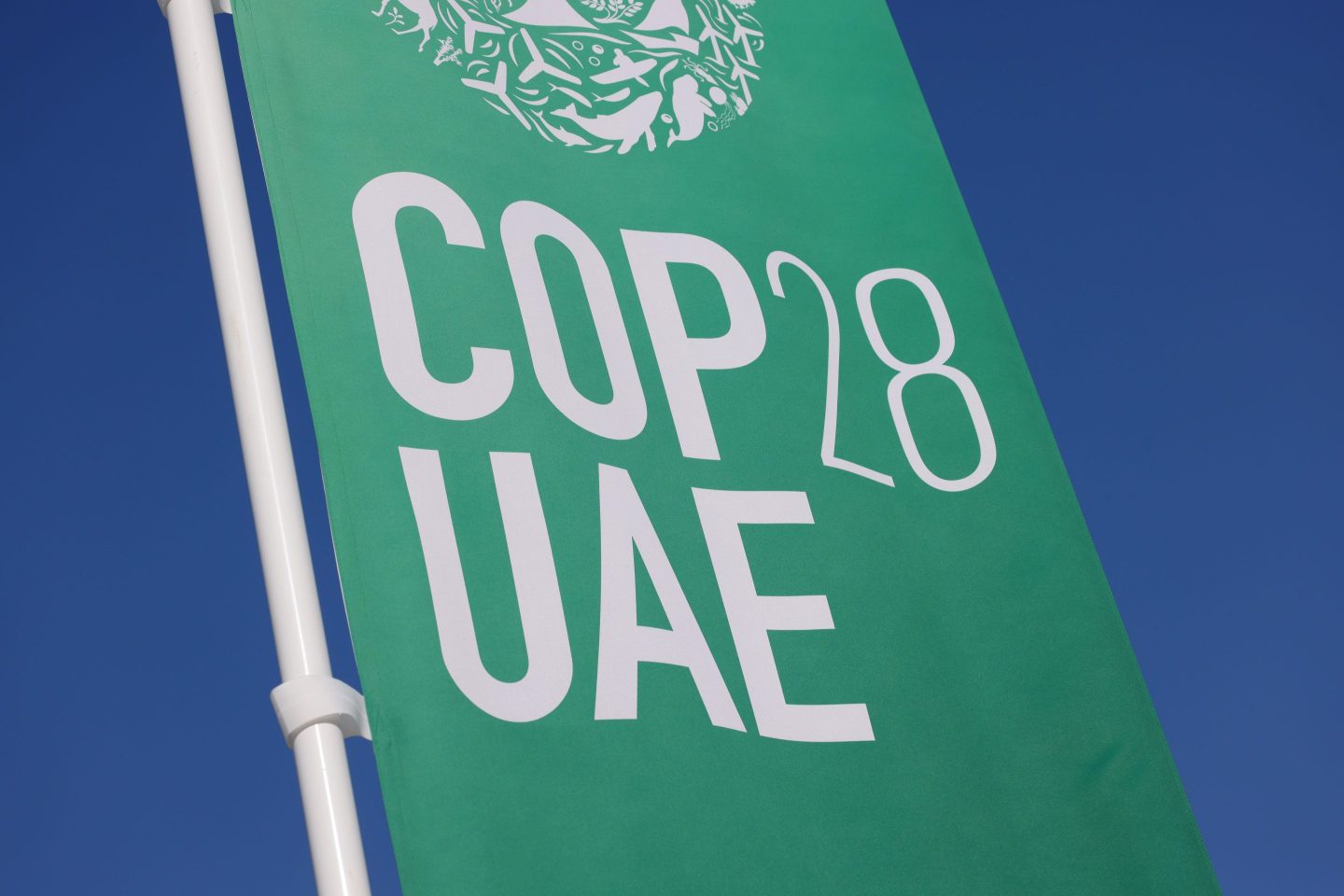Good morning, Peter Vanham here in Geneva.
The biggest news from the ongoing U.N. climate meeting in Dubai may not be climate-related at all.
As Alan pointed out last Friday, the Conference of the Parties (COP) meeting in the UAE “bustles with prominent business leaders” this year. While some see that as an opportunistic move by COP28 President Sultan Al Jaber, who also wears the hat of chairman of the UAE’s oil company ADNOC, others consider it simply to be a good thing that business is stepping up to the climate plate.
Even more significantly, the prominence of business at COP in some ways marks the end of the purely government-led multilateralism of the 20th century and heralds a new era in which public-private cooperation to face major global challenges has become the norm.
Consider the case of Aon, the Chicago-based risk management firm. Its president, Eric Andersen, was at COP this week–a first for the company. “We meet here with clients we didn’t have before, such as the Red Cross and the World Bank,” he said. “To match them with the private sector has been an evolution,” he added, “but we understand each other better now.”
The specific case of Aon includes enlisting the Red Cross for “pre-disaster financing” so that crisis response funding gets where it is needed faster, with greater impact. It is a product Aon is very familiar with, but that until recently was taboo for international organizations and NGOs. But in combatting climate change, “old models don’t work as well, and new models are not yet proven,” he told me, which opened the door to private sector solutions.
A similar evolution can be seen everywhere in the multilateral system. Earlier this year, for example, the U.K.-based insurer Lloyds of London teamed up with the U.N. to improve access to insurance for climate-vulnerable countries. At COP, even the China-based Asian Infrastructure Investment Bank (AIIB) urged closer public-private cooperation to close the climate funding gap.
The rapprochement between business and international organizations goes both ways. I met with Paul Polman in Dubai, the former longtime CEO of Unilever. He is at COP as vice chairman of the UN Global Compact, a UN initiative that enlists companies to achieve UN objectives. The UN climate arm also has a “Global Innovation Hub” that invites innovators to solve cities’ climate challenges.
Officially, the UN resolution that is voted in the central hall is still only open to input from member states, making it a sort of inner sanctum or Forbidden City of COP. But as it has become increasingly clear in recent years, climate progress cannot be made without private sector innovations. The structural consequence is a closer entanglement between business and the multilateral system.
More news below.
Peter Vanham
peter.vanham@fortune.com
@petervanham
TOP NEWS
Fed rates
Economists have predicted that the Federal Reserve’s rate-hiking campaign is now over, but expect the Fed to hold off on interest rate cuts until at least July 2024. Three-quarters of the academic economists surveyed by the Financial Times expect the Fed to lower the federal funds rate from its current 22-year high by just half a percentage point or less next year. Financial Times
Nvidia CEO on AI safety
Prominent leaders and scientists have repeatedly issued warnings about the existential threat they believe AI poses to humanity–from a 22-word statement likening the societal risk to nuclear war to an open letter calling for a pause in AI developments. But Nvidia’s CEO Jensen Huang isn’t concerned. Instead, he has “every confidence” that the world's leading AI chipmaker will invent technologies and practices to “keep technology safe”. BBC
Climate tipping points
Bill Gates may see the “glass half-full” on climate change, but a major report put together by more than 200 researchers has warned that we are already on the verge of crossing five climate “tipping points” and risk triggering “devastating domino effects,” including the "loss of whole ecosystems, mass displacement, and financial collapse." Guardian
AROUND THE WATERCOOLER
Elon Musk’s not wrong: People really are less willing to work post-pandemic—and COVID handouts could be the cause, claim the world’s most senior central bankers by Orianna Rosa Royle
Billionaires are in the midst of their own Great Wealth Transfer, and it’s changing the face of the 10-figure club forever by Alicia Adamczyk
Corporate America’s hiring spree is cooling—economists say we should all take that as a good sign by Will Daniel
HR experts say you need to hire workers for their long-term potential and not just the current job opening: Find ‘that great business athlete’ by Paige Mcglauflin And Joseph Abrams
The future of AI is too important to be decided behind closed doors. There is a better way by Darío Gil
Access to modern stoves could be a game-changer for Africa’s economic development–and help cut the equivalent of the carbon dioxide emitted by the world’s planes and ships by Akinwumi Adesina and Fatih Birol
This edition of CEO Daily was curated by Orianna Rosa Royle.
This is the web version of CEO Daily, a newsletter of must-read insights from Fortune CEO Alan Murray. Sign up to get it delivered free to your inbox.













